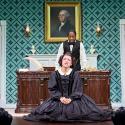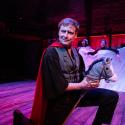There's something to be said for encountering a playwright fresh out of the starting gate. Since his debut play Speech & Debate premiered Off Broadway almost a decade ago, Stephen Karam has gone on to write two altogether wonderful plays, the most recent of which, The Humans, won last year's Tony. This fledgling effort isn't in that league but has its charms, and Tom Attenborough's defibrillator production further marks out the fast-rising Patsy Ferran as a talent busily making her own way towards the big time.
Ferran's success in the play's pivotal part of Diwata is doubly notable given the unachieved ambitions that beset her character, who wants nothing more than the musical theatre renown that might come from starring as Winifred in a Salem, Oregon, high school production of the Mary Rodgers musical Once Upon a Mattress. Shut out from that opportunity, Diwata is channeling her energy into a new musical, Crucible, based on the Arthur Miller classic and an inevitable choice for a budding thesp who happens to inhabit a town called Salem. Mary Warren, Diwata has decided, could be her star-making role, not least if she could bring to it something of the welly that Idina Menzel gave to Wicked.
 While pondering the dynamics of so-called "Group Interpretation", which doubles as one of the titles given to the various scenes, Diwata falls in with two male students embarked upon quests of their own. Solomon (Tony Revolori, best known as the endearing lobby boy from The Grand Budapest Hotel and pictured right) is an inquisitive 16-year-old who during the course of the 95-minute play must answer some fundamental questions about himself. By contrast, the slightly older Howie (Douglas Booth, putting his celluloid poutiness to one side) is first seen engaging in online banter with a male stranger, only to report later that his own gay self-confidence dates back to around the time that he was 10.
While pondering the dynamics of so-called "Group Interpretation", which doubles as one of the titles given to the various scenes, Diwata falls in with two male students embarked upon quests of their own. Solomon (Tony Revolori, best known as the endearing lobby boy from The Grand Budapest Hotel and pictured right) is an inquisitive 16-year-old who during the course of the 95-minute play must answer some fundamental questions about himself. By contrast, the slightly older Howie (Douglas Booth, putting his celluloid poutiness to one side) is first seen engaging in online banter with a male stranger, only to report later that his own gay self-confidence dates back to around the time that he was 10.
This motley trio of teens are brought together by the debating society that gives the play its title and that boasts an ardent if none-too-numerous membership of three. (The play's two other characters – both authoritative adults – are ably played by the same actress, Charlotte Lucas.) The band of misfits conjoined by a life online represents some kind of defense against the darker aspects of a world that includes a predatory if unseen drama teacher: the published text of the play reproduces some of the cyber-chat in 2004 that led Karam toward his play between the onetime mayor of Spokane, Washington, and an 18-year-old who was clearly the inspiration for Howie here.
The bittiness of the whole and the sense of the play needing to kickstart itself afresh with each scene starts to pall after a while, and one wonders whether the forthcoming film version, starring Karam alumna Sarah Steele, might allow for a smoother experience. Rather too much is made of Salem as a cultural moniker, though the passage of time between 2007 and now has resulted in a fleeting (and funny) reference to Mike Pence.
Nor, at least on this occasion, are the roles of equal weight, at least not with the ceaselessly watchable Ferran hitting every sad-funny note while her large eyes absorb the injustices that have befallen Diwata's young life. Blessed with comic timing that makes one wonder when TV will get smart and develop a show entirely around her, Ferran mines the comic gold in a throwaway remark like "please don't riff" without ever once milking the moment. Let's just say that Diwata may languish in quasi-obscurity, but the actress playing her is on her way.















Add comment